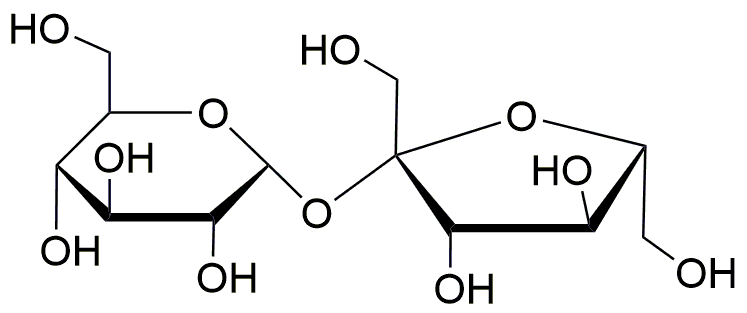Sucrose is widely utilized in research focused on:
- Food Industry: As a natural sweetener, it enhances flavor in a variety of products, from baked goods to beverages, making it a staple in food manufacturing.
- Pharmaceuticals: Used as an excipient in drug formulations, it helps to improve taste and stability, making medications more palatable for patients, especially children.
- Biotechnology: Serves as a carbon source in microbial fermentation processes, aiding in the production of biofuels and bioplastics, which are crucial for sustainable development.
- Cosmetics: Acts as a humectant in skincare products, helping to retain moisture and improve skin texture, thus enhancing the overall effectiveness of cosmetic formulations.
- Research Laboratories: Commonly used in biochemical assays and as a standard in various analytical methods, providing reliable results in experiments related to enzymatic activity and carbohydrate metabolism.
General Information
Properties
Safety and Regulations
Applications
Sucrose is widely utilized in research focused on:
- Food Industry: As a natural sweetener, it enhances flavor in a variety of products, from baked goods to beverages, making it a staple in food manufacturing.
- Pharmaceuticals: Used as an excipient in drug formulations, it helps to improve taste and stability, making medications more palatable for patients, especially children.
- Biotechnology: Serves as a carbon source in microbial fermentation processes, aiding in the production of biofuels and bioplastics, which are crucial for sustainable development.
- Cosmetics: Acts as a humectant in skincare products, helping to retain moisture and improve skin texture, thus enhancing the overall effectiveness of cosmetic formulations.
- Research Laboratories: Commonly used in biochemical assays and as a standard in various analytical methods, providing reliable results in experiments related to enzymatic activity and carbohydrate metabolism.
Documents
Safety Data Sheets (SDS)
The SDS provides comprehensive safety information on handling, storage, and disposal of the product.
Product Specification (PS)
The PS provides a comprehensive breakdown of the product’s properties, including chemical composition, physical state, purity, and storage requirements. It also details acceptable quality ranges and the product's intended applications.
Certificates of Analysis (COA)
Search for Certificates of Analysis (COA) by entering the products Lot Number. Lot and Batch Numbers can be found on a product’s label following the words ‘Lot’ or ‘Batch’.
Numéro de catalogue
Numéro de lot/série
Certificates Of Origin (COO)
This COO confirms the country where the product was manufactured, and also details the materials and components used in it and whether it is derived from natural, synthetic, or other specific sources. This certificate may be required for customs, trade, and regulatory compliance.
Numéro de catalogue
Numéro de lot/série
Safety Data Sheets (SDS)
The SDS provides comprehensive safety information on handling, storage, and disposal of the product.
DownloadProduct Specification (PS)
The PS provides a comprehensive breakdown of the product’s properties, including chemical composition, physical state, purity, and storage requirements. It also details acceptable quality ranges and the product's intended applications.
DownloadCertificates of Analysis (COA)
Search for Certificates of Analysis (COA) by entering the products Lot Number. Lot and Batch Numbers can be found on a product’s label following the words ‘Lot’ or ‘Batch’.
Numéro de catalogue
Numéro de lot/série
Certificates Of Origin (COO)
This COO confirms the country where the product was manufactured, and also details the materials and components used in it and whether it is derived from natural, synthetic, or other specific sources. This certificate may be required for customs, trade, and regulatory compliance.

